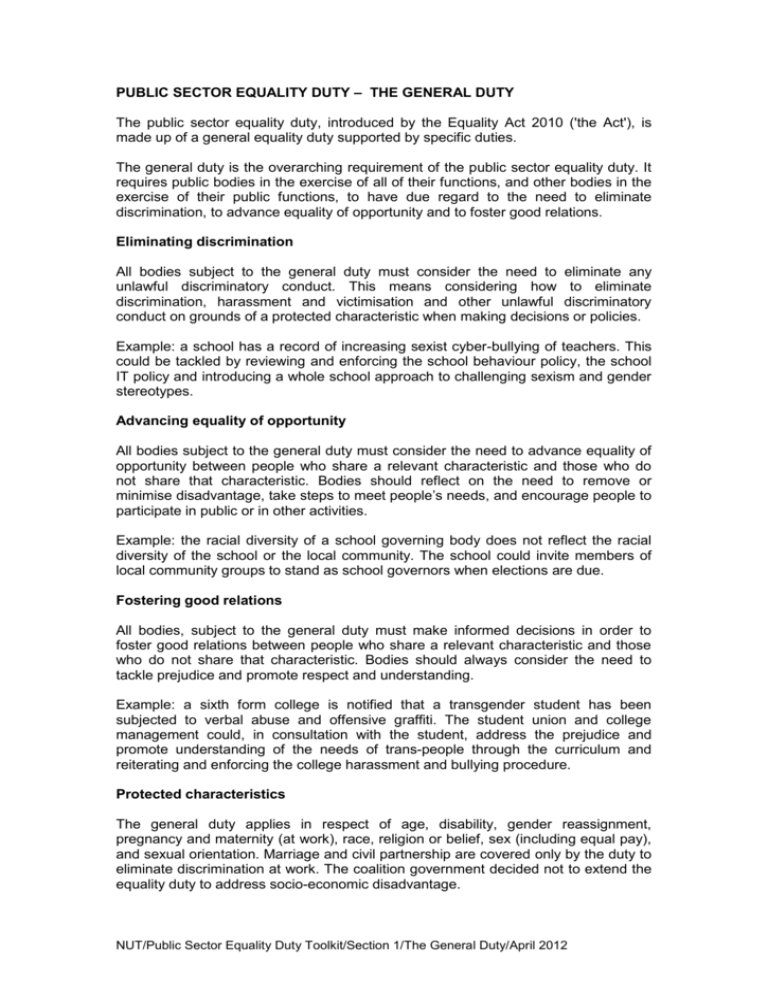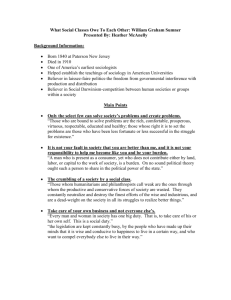The General Duty - National Union of Teachers
advertisement

PUBLIC SECTOR EQUALITY DUTY – THE GENERAL DUTY
The public sector equality duty, introduced by the Equality Act 2010 ('the Act'), is
made up of a general equality duty supported by specific duties.
The general duty is the overarching requirement of the public sector equality duty. It
requires public bodies in the exercise of all of their functions, and other bodies in the
exercise of their public functions, to have due regard to the need to eliminate
discrimination, to advance equality of opportunity and to foster good relations.
Eliminating discrimination
All bodies subject to the general duty must consider the need to eliminate any
unlawful discriminatory conduct. This means considering how to eliminate
discrimination, harassment and victimisation and other unlawful discriminatory
conduct on grounds of a protected characteristic when making decisions or policies.
Example: a school has a record of increasing sexist cyber-bullying of teachers. This
could be tackled by reviewing and enforcing the school behaviour policy, the school
IT policy and introducing a whole school approach to challenging sexism and gender
stereotypes.
Advancing equality of opportunity
All bodies subject to the general duty must consider the need to advance equality of
opportunity between people who share a relevant characteristic and those who do
not share that characteristic. Bodies should reflect on the need to remove or
minimise disadvantage, take steps to meet people’s needs, and encourage people to
participate in public or in other activities.
Example: the racial diversity of a school governing body does not reflect the racial
diversity of the school or the local community. The school could invite members of
local community groups to stand as school governors when elections are due.
Fostering good relations
All bodies, subject to the general duty must make informed decisions in order to
foster good relations between people who share a relevant characteristic and those
who do not share that characteristic. Bodies should always consider the need to
tackle prejudice and promote respect and understanding.
Example: a sixth form college is notified that a transgender student has been
subjected to verbal abuse and offensive graffiti. The student union and college
management could, in consultation with the student, address the prejudice and
promote understanding of the needs of trans-people through the curriculum and
reiterating and enforcing the college harassment and bullying procedure.
Protected characteristics
The general duty applies in respect of age, disability, gender reassignment,
pregnancy and maternity (at work), race, religion or belief, sex (including equal pay),
and sexual orientation. Marriage and civil partnership are covered only by the duty to
eliminate discrimination at work. The coalition government decided not to extend the
equality duty to address socio-economic disadvantage.
NUT/Public Sector Equality Duty Toolkit/Section 1/The General Duty/April 2012
Functions
The general duty applies in respect of all of the functions of public authorities listed
under schedule 19 of the Act and to the public functions of other bodies. So, the
general duty:
applies to all local authorities and all schools and colleges, including
independent establishments, in respect of their public functions; and
applies to all local authorities and schools and colleges listed in schedule 19
in respect of their non-public functions; but
does not apply to bodies not listed in schedule 19, e.g. independent schools,
in respect of their non-public functions.
Public functions, education functions and employment functions
A public function has the same meaning in the Equality Act 2010 as it does in the
Human Rights Act 1998; a public function is 'a function of a public nature'.
This definition encompasses a wide range of public services such as the provision of
health care, fire services, housing services and education. So, any body with a public
education function is subject to the general duty in respect of that function. This will
include all schools and colleges in the state sector and also independent schools
which are not public bodies but which perform a public function. Non-public bodies
must ‘have regard’ to the general duty when exercising a public function.
All public authorities listed in schedule 19 are subject to the general duty in respect of
all of their functions. This includes the public functions e.g. housing and education
services, but also the additional functions, for example, the employment of staff. So,
all local authorities, schools and colleges in the state sector must have due regard to
eliminating discrimination, etc in the exercise of their functions as an employer.
Bodies not listed in schedule 19 are subject to the general duty in respect of their
public functions only. Employment by a private body is likely to be regarded a
function of a private nature so independent schools are unlikely to be subject to the
general duty in respect of their employment functions.
Public authorities of the Equality Act
The general duty applies to all public authorities listed under schedule 19, including:
local authorities;
governing bodies of schools maintained by a local authority (including
community, community special, voluntary controlled, voluntary aided,
foundation, foundation trust, foundation special schools and maintained
nursery schools and PRUs);
further education and sixth form colleges;
governing bodies of publicly funded universities;
the proprietors of City Technology Colleges, City Colleges for Technology or
the Arts; and
the proprietors of academies and free schools.
NUT/Public Sector Equality Duty Toolkit/Section 1/The General Duty/April 2012








![(NPD-60) []](http://s3.studylib.net/store/data/007320126_1-47edb89d349f9ff8a65b0041b44e01a8-300x300.png)
